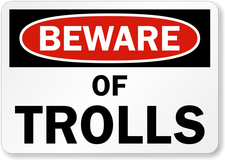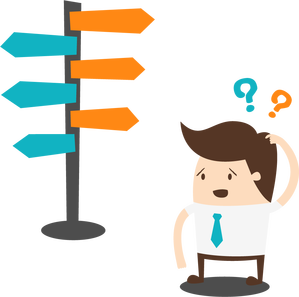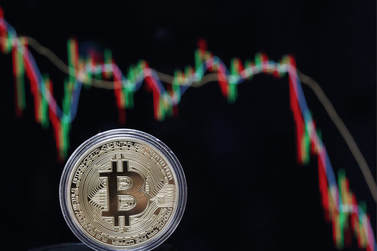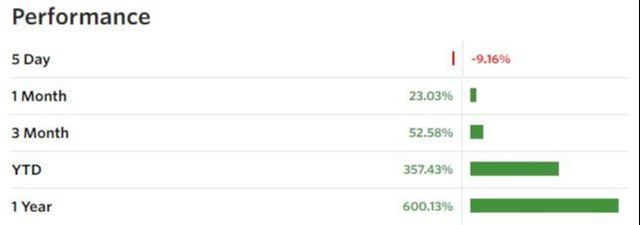|
Des W Woodruff (aka d7)Des is the President and Founder of FreeTradingVideos.com, Inc. (FTV) dba Grok Trade and FreeOnlineTradingEducation.com (FOTE). He created the company out of a desire to equip trading aficionados with the education and skills necessary to survive today's market. Des has nearly two decades of personal live-market trading experience trading privately and institutionally. |
6 Things To Stop "Short Trolls"

Traders can make money by selling short a stock, which is different than going buying long a stock. Those who short sometimes go rogue and publically trash a stock in hopes for it to drop. These people are (now) known as "Short Trolls." A 'Short Troll' is identified as an ugly public nuisance who rapid-fires posts of criticisms about a stock in various investment forums or trading chat rooms. You know them well. They are loud and obnoxious and post often--too often. Every post is negative and they only criticise and do so unmercifully.
Traders/investors who analyze both fundamental and technical analysis to base their decisions to go long or short a stock is considered to be savvy. On the other hand, 'Short Trolls' are mental midgets who choose to go the path of least resistance and smear others. Perhaps they should wear brighter colors.
The daily deluge of never ending assaults can be nauseating. It's especially grand when 'short trolls' team up together and wage a collective assault. These trolls are like the boisterous town drunks who group up and stumble over to your party.
WHY Do Short Trolls Do This? Money-money-money! 'Short trolls' are short the stock and the only way they make money is if the stock decreases in value. For this reason 'short trolls' veer off into criminal territory and say and publish inaccurate information and even defames to adversely manipulate the stock price.

- Name them for what they are for all to see. They are "Short Trolls."
- Point out 'Short Trolls' to others. Make them infamous.
- Do not validate 'Short Trolls.' Ignore the points in their posts.
- Group them together. Start a public list of 'Short Trolls' for others to see.
- Report their criminal activity to admin/moderators.
- Report them to the SEC so they are on their radar. Report their crimes here.
For more information read this and consider going on the offensive.
AUTHOR: d-seven owner of Grok Trade (@GrokTrade)
PS. If this article has helped you, share it with others.
The "short and distort" is a known scam that is being actively prosecuted. A "short and distort" scammer first short-sells the stock, and then fraudulently attempts to lower the stock's price via posting criticisms or negative predictions about the stock's business, products, management, alliances, etc. The scammer then covers their short position buying back the stock at a lower price to gain a profit. The crime is when the investor benefits financially by posting negative posts with the intention to harm the credibility and trust of a publically traded company, its stock, its products, and/or its management. Litigation can be brought against anyone suspected of such fraudulent activities.
REGULATION: Short and Distort manipulators are being targeted--especially in the the category of stocks most often associated with this scheme---pink sheet and OTC stocks. In general, penny stocks have been the target of heightened enforcement efforts.
"My wife and kids do not know how much money I lost yet."

Hi d-seven,
I have been following you on Youtube for the last month. I did complete your 101 course.
I am new to trading and I really screwed up. I wish I would have found you earlier. I started trading in July with $17000, now I have less than $7000 left. I wish I would have known about you and taken a few thousand and got training from Grok Trade first. I really blew it. I had some folks training me on how to trade options and I did pretty good picking trades. Almost every trade would have made money on if I had know how and when to exit, but I left them too long each one lost large amounts of money. I played Facebook and Apple on earning and got burned big time! I did not know any better. I am a Mechanical Engineer so I am very use to analyzing data, but this kind of analysis was not as easy as I thought. I really need to turn this around, a large chunk of this was borrowed from my 401K. I can't seem to catch a break lately. I want to be a turnaround story but now I am tapped out. My wife and kids do not know how much money I lost yet. It took years to save this money up. What can I do?
Best regards
Brian G. (Last name removed)
(City removed) Georgia
(Phone removed)
"Some say that “trading is the hardest easiest thing to do.” "
By no means are you in a boat all alone. We all have taken a hit in our trading accounts when we began trading. As we delve into the world of trading, we quickly realize just how expensive "market tuition" can be. It's NO fun to lose, but sometimes losses are necessary as the pain delivered by drawdowns tend to awaken us to the very real risks that we face as traders who trade the live markets. You broke some major rules (i.e. trading leverage (options) before you are a proficient trader, playing earnings, not having a trading plan, etc.) Amatuer mistakes.
As a former mentor for Rich Dad, Poor Dad and being the owner of my own education company, I have personally mentored over 800 traders. You cannot begin to imagine the horror stories that I would hear from my new student mentees. By the time these traders had their own "coming to Jesus" talk with themselves to finally get mentoring, they had unfortunately already relinquished their hard earned capital to those more savvy traders who were opposite their losing trades. If I had to guess the tally of losses before their mentoring, it might be between $50-75 million in losses.
Like you, virtually every student would confess to me, like a parishioner to a priest, that their losses were due to their own "stupid mistakes" and hard-headed risk taking. It was seldom lost with a student that their losses were a derivative of their own negligence of failing to first establish a basis of education. If I had a nickel for every time I heard a student say that they had wished that they came to me for mentoring before taking their relatively large hit, I would have much more capital to trade.
Oh, the dreaded disclosure to the wifey. ouch. The fear of telling your wife how much you are down in the markets is very real. Back in the day, before I got trained, I had more losing days than winning days. EVERY DAY, my wife would ask me how I did in the markets. After the markets had concluded for the day, I dreaded walking out of my office. It was excruciating to divulge the truth about the constant losses. Just confessing my gambling sins, in dollars lost, was like salt in my wound. I was hard enough on myself, but having to tell my wife (whom I had to previously convince that trading would be a great side business) was nothing short of gut wrenching. Coming clean with your wife will not be easy, but its the right thing to do. Again, I (and the rest of us) all have been right where you are today and it can be both maddening and frightening at the same time, but you can overcome.
Some say that “trading is the hardest easiest thing to do.” This is right. Trading really is not overly complex or taxing for most traders, BUT it can be very difficult to master. Because you are new to trading and have much to learn, can actually work to your benefit. You see, some of the more seasoned traders who come for mentoring have a hard time applying new principles due to the difficulty of being 'rewired.' You, on the other hand, are fresh and there is NO rewiring necessary to slow you down. You just need to learn the rules, strategies, principles, concepts, and calculations that significantly stack the odds in your favor when trading in the live markets. Boom. The you're golden.
Please hear me. Do NOT beat yourself up too badly. This is the time to have a "coming to Jesus" talk with yourself. Maybe trading is not for you and this hobby is just too expensive and its time to put your time into something else. That's OK.
For me, I knew I had to either quit trading altogether, or go get formal training the right way to work through my mistakes and trading deficiencies. I chose the latter, and that was one of the best business decisions of my entire life. When I first began to trade (17 years ago), I blew through two small accounts ($2k and $8k). Because I was only 25 and that was all my trading cash at the time, it was hard to stomach. Today, on the other hand, things are much different. For example, the recent volatility the past few days made me some nice profits. Yesterday, I ordered my broker (Interactivebrokers) to cut me a check for $20k of those profits. It's funny how differently the norms are compared to what they used to be.
Before progressing further, ask yourself these questions:
1) Do I want to be a trader?
2) Should I be a trader? (Too lazy to learn, a gambler, etc.)
3) Can you trade slow with minimal risk for minimal gains?
(If you answer NO to any of these, find another less expensive hobby.)
4) What will your wife say when she finds out about your problem?
5) Will your wife want you to fix your problem?
6) What will you do to fix your problem?
7) How much money will your wife want you to spend to fix your problem?
Regardless what you do next, stay positive and do what's best for you and your family. We care about you and your tomorrow.
Future successes,
d-seven
PS. What is it that we can do to help you? I (strongly) suggest taking our mentorship in Vegas in November (see here). We also do online mentorships monthly, too.
It's not too late-- Start off 2015 the right way and decide that you WILL BE more educated and better prepared than other traders who you are trading against each and every day you're in the markets.
Overall, even the uneducated investors (who were long the market) fared well in 2014. They say, "Everyone is a genius in a bull market."
As you know, stocks end the year bullish. Most indices did fairly well, unless you were in small caps. Below is the breakdown of the final tally of the 2014 stock market results.
2014 Final Numbers
- COMPQ up 13.4%
- S&P500 up 11.4%
- DJIA up 7.15%
- RUT up 3.5%
As a trader for 17 years this February and an educator of more than 800+ traders, I can tell anyone who will listen that trading is about 1) education and 2) experience-- and in that exact order. If you mess up this important order , you will pay dearly in 'market tuition.'
Ex. The secret to a successful trading career is much like the secret to properly flying a plane. When flying a plane, it's imperative that you get your education (ground school) first and then log your experience second; It's costly, in more ways than one, when the order is wrong. In other words, do NOT try to fly a plane without first enrolling in excellent education. It's a simple concept that even the smartest of wanna-be-traders get wrong.
Continued success,
Des Woodruff
PS. Make 2015 all about formalized trading education. Make it your goal to be more educated and better prepared than any other trader out there.
Des Woodruff (aka d-seven)
Des is a visionary who spots future market trends and started several ventures considered first-to-market.
As a serial entrepreneur with a propensity for strategic innovation, Des owns an array of businesses across diverse sectors.
In the financial industry, Des is the President and Founder of FreeTradingVideos.com, Inc., operating under the names GrokTrade and FreeOnlineTradingEducation.com and a fund manager at his quant fund which uses trading algos.
Des publishes regular articles on various topics on investing, the emergence of AI in trading, and digital currency
Archives
July 2024
December 2023
October 2023
June 2023
May 2023
March 2023
January 2023
December 2022
December 2020
April 2020
March 2018
September 2017
October 2015
August 2015
January 2015



















 RSS Feed
RSS Feed